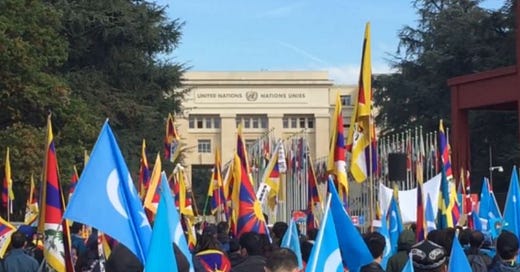Trump makes racism his closing argument. That’s bad news for Uyghurs and Tibetans if he wins.
Trump’s party’s denigration and paternalization of America’s ethnic minorities mirrors the CCP’s attitude.
Did you watch Donald Trump’s rally at Madison Square Garden last week? Among other things,[1] the event served as a capstone of a campaign and a candidate that has made racism the core message and promise to Americans.
Beyond the domestic consequences of what a racism-fueled presidency would mean for our country, it would have ramifications for U.S. foreign policy. Would a Trump Administration have any moral authority to press other governments to respect the rights of their ethnic minorities, when its Leader treats Americans ethnic majorities with derision and paternalism?
Trump’s racism is well documented and beyond question. “Animals.” “Vermin.” “Shithole countries.” “Haitian immigrants eating pets.” Courting support from white supremacists.
Trump didn’t invent this, he merely harvested the anti-anti-racism that has animated his party through Nixon’s “silent majority,” Reagan’s Neshoba speech, Helms’ “Hands” ad and Trump’s “Mexican rapists” comment. A priority for his party’s governing agenda has been to roll back anti-racism policies and education using buzzwords like “CRT,” “DEI” and “woke,” claiming that such policies make the majority ethnic group uncomfortable, mimicking CCP rhetoric about “hurting the Chinese people’s feeling.”
The People’s Republic of China engages in racism toward the ethnic minorities within its borders, treating them paternalistically as people that need to be controlled and assimilated into the majority’s social and political structure.
If Trump attains office again, what would that mean for Uyghurs and Tibetans? How can an Administration that has made racism central to its governing agenda have any moral authority to call out racism in the PRC? More importantly, could a Trump presidency even recognize that the Chinese Communist Party is being racist?
Yes, I know that President Trump signed several pieces of legislation to promote the human rights of Uyghurs, Tibetans and Hong Kongers. These were good. I have praised the Trump Administration for reorienting U.S. posture toward China.
But I think the Trump Administration did the right thing for the wrong reason.
Think of the talking points staff drafted to recommend that President Trump sign these bills. Can we imagine they included principled points about Uyghurs and Tibetans not being treated equally under the law, about being denied their civil rights, about not having their dignity and humanity respected? Or do we think they told the President that by signing these bills he would look tough on the CCP and get better leverage for his Great Trade Deal?
Whatever works, right? He signed them. But transactionalism is not the basis for a long-term principled approach that has a chance of yielding results for Uyghurs and Tibetans.
Naming and shaming is a legitimate tool of human rights policymaking. But sanctions are punitive and not a substitute for a broad policy based on a fundamental moral argument. If the U.S. government is unable or unwilling to articulate that Uyghurs and Tibetans should not be subject to racist CCP policies because the President doesn’t see racist policies as a negative, then we’re not really helping their cause, are we?
Candidate Trump has promised that his first call in the Oval Office would be to Xi Jinping to demand that he revive the previously agreed-to $50 billion agriculture deal. If Trump does happen to mention Uyghurs and Tibetans, do we think he is going to castigate Xi for his racist policies toward them? Or is he going to praise Xi Jinping for controlling them with an “iron fist” as he has said publicly on numerous occasions? Is he going to tell Xi it was wrong to put Uyghurs in mass detention camps, or will he repeat his comment to Xi that putting Uyghurs in camps was “exactly the right thing to do,” because Trump wants to do the same thing to ethnic minorities in the United States?
Chinese officials seek to deflect criticism of their mistreatment of ethnic minorities with a ‘whatabout’ tactic of pointing out the legacy of slavery and the existence of racial discrimination in the U.S. today. U.S. officials -- those in the Biden Administration -- have responded by conceding that America struggles with racism, saying they “welcome the opportunity to discuss concerns related to racism – concerns we take seriously and are serious about addressing” in order to tell China that is needs to do the same.
Trump cannot do the same. His Administration, through its “1776 Commission” and his party’s efforts at the state level, have actively worked to revise history and white-wash (literally) America’s past and present struggles with racism. Just like the CCP is doing.
I want the United States government to be a leading voice against human rights abuses around the world based on racial and ethnic discrimination (among all the rest), including for Uyghurs and Tibetans. It will be unable to do so under a president who thinks that racial and ethnic discrimination isn’t a bad thing.
[1] The venue (the site of the 1939 Nazi rally), the message and everything else over nine years, enabled many commentators, including historians and former generals, to arrive at or confirm the conclusion that Trump and his movement are fascist.



